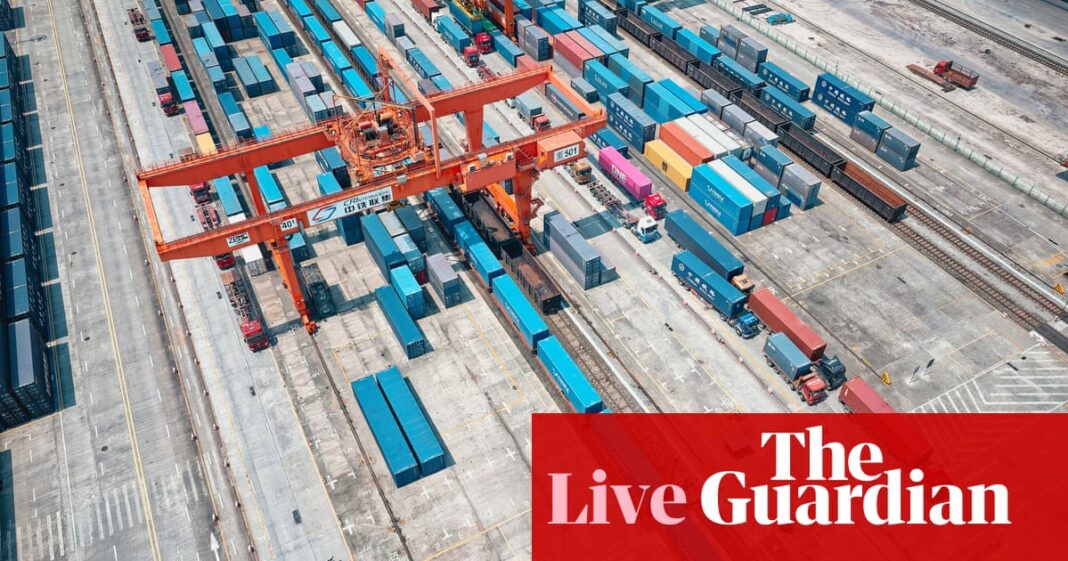Bank of England MPC members to discuss interest rates with MPs
Over in parliament, the Treasury committee is holding a session with Bank of England policymakers.
They’re hearing from governor Andrew Bailey, the Deputy Governor for Financial Stability, Sarah Breeden, and external members Dr Catherine Mann and Dr Swati Dhingra.
They’ll discuss the Bank’s decision to reduce the Bank Rate by 0.25 percentage points to 4.25% in early May, as well as the increase in inflation in April and the impact of US tariff policy.
This week, as part of our ongoing scrutiny of the @bankofengland’s Monetary Policy Reports, we’ll hear from members of the Monetary Policy Committee
Watch live from 10.15am on Tuesday 3 June 👇
— Treasury Committee (@CommonsTreasury) June 2, 2025
Key events
BoE governor confident pay growth will slow
Bank of England governor Andrew Bailey is confident that UK pay growth will slow this year.
Bailey takes issue with Catherine Mann’s argument (see last post) that the labour market hasn’t weakened this year, telling MPs that the UK labour market “has loosened somewhat” since February.
Governor Bailey points to recent data showing pay growth has slowed faster than expected, as he explains why he voted for a quarter-point cut to interest rates last month.
Although wages have been rising faster than is consistent with the Bank’s 2% inflation target, Bailey says the Bank believes pay growth will come down this year, based on what it is seeing in the data, and what firms around the country are telling the BoE.
He is sticking with his policy of taking a “gradual and careful” approach to interest rate cuts.
Deputy governor Sarah Breeden says he also favoured the quarter-point cut in Bank rate, “even absent” international developments (ie, trade wars).
She says the persistence of inflation will depend on pay growth, citing predictions from the Bank’s agents that pay rise settlements will slow to 3.7% by the end of this year, more than a percentage point lower than where we are today.
BoE’s Mann defends rate vote flips
Bank of England policymaker Catherine Mann has pointed to recent easing in financial market conditions to explain why she has switched her position on interest rate cuts twice this year.
Mann, who had been traditionally seen as a hawkish member of the BoE’s monetary policy committee, is in the spotlight after flipping to a dovish position in February when she voted for a half-point cut in interest rates (when most colleagues favoured a quarter-point cut).
Then in May she flipped back, and was in the minority voting to leave rates on hold (when the MPC plumped for another quarter-point cut, in a three-way split).
Today, she tells MPs that the two votes have to be looked at in the context of economic and financial market conditions.
In February, Mann explains, she was looking at the prospects for the UK labour market to “loosen in a non-linear way”, as increases to the minimum wage and employers’ national insurance contributions hit the jobs market.
At that stage, she says, a 50bp cut was needed as financial conditions were not consistent with those risks.
But by May, things had changed. Partly because the labour market had not loosened as much as she had feared. Consumption was no weaker than expected, she tells the Treasury commmitee, and inflation was not decelerating in a way consistent with hitting 2% target, with goods prices rising not falling.
But most importantly, from February to May, financial markets had eased quite dramatically [thanks to Donald Trump’s trade war spooking investors]. That, Mann says, actually delivered more of an easing than the 50bp which she voted for in February, she insists.
Incidentally, FT Alphaville recently worked out that Catherine Mann now holds the silver and bronze medals for rapid vote shifts.
Bank of England MPC members to discuss interest rates with MPs
Over in parliament, the Treasury committee is holding a session with Bank of England policymakers.
They’re hearing from governor Andrew Bailey, the Deputy Governor for Financial Stability, Sarah Breeden, and external members Dr Catherine Mann and Dr Swati Dhingra.
They’ll discuss the Bank’s decision to reduce the Bank Rate by 0.25 percentage points to 4.25% in early May, as well as the increase in inflation in April and the impact of US tariff policy.
This week, as part of our ongoing scrutiny of the @bankofengland’s Monetary Policy Reports, we’ll hear from members of the Monetary Policy Committee
Watch live from 10.15am on Tuesday 3 June 👇
— Treasury Committee (@CommonsTreasury) June 2, 2025
Eurozone inflation falls to 1.9%
The cost of living squeeze across the eurozone has eased last month, potentially smoothing the way for cuts to interest rates.
The Eurozone inflation rate fell to 1.9% in May, down from 2.2% in April according to a flash estimate from statistics body Eurostat.
That takes euroozone inflation below the European Central Bank’s 2% target, for the first time since September 2024.
The decline was driven by cheaper energy prices – energy prices fell by 3.6% across the eurozone, having been flat in April.
Food, alcohol & tobacco is expected to have the highest annual inflation rate in May, at 3.3% (up from 3.0% in April), followed by services (3.2%, compared with 4.0% in April), non-energy industrial goods (0.6%, stable compared with April) and energy (-3.6%, stable compared with April).
Diego Iscaro, head of European Economics at S&P Global Market Intelligence, says:
“This easing inflation is good news for households, as it will help to offset some of the headwinds on consumption stemming from a highly uncertain economic environment.
“May’s inflation print, coupled with the moderation in wage growth during the first quarter, suggests that the ECB will almost certainly cut rates by 25bp later this week. We expect a disinflationary environment will drive further monetary policy easing during the second half of the year, with the deposit rate likely to reach a low of 1.5% during the third quarter.”
Stock markets dip after OECD growth downgrade and weak China factory data
European stock markets are in the red this morning, as investors digest the OECD’s downgrade growth forecasts (see here) and the weak manufacturing data from China (see here).
Germany’s DAX has dipped by 0.2%, while France’s CAC has lost 0.35%.
The UK’s FTSE 100 share index has lost 26 points, or 0.3%, to 8747 points. Mining companies are among the fallers, following a drop in commodity prices after China’s factory output fell at its fastest rate since September 2022.
The futures market indicates Wall Street will open lower too.
Russ Mould, investment director at AJ Bell, says investors are showing signs of nervousness around tariffs and the economic outlook.
“The OECD has downgraded its forecast for global economic growth as the effects of the trade war start to be felt. It’s only a small revision – from 3.1% to 2.9% for 2025 – but it’s still enough to cause investors some indigestion as they consume their morning news. The downgrade weighed on the mining sector as the market fears it could mean reduced demand for commodities, and therefore a potential knock to the price of metals and minerals.
“The 90-day pause on tariffs has just over a month before expiration, meaning the pressure is on countries to do deals with the Trump administration. Reports suggest that Trump wants best offers on trade negotiations by Wednesday, perhaps to avoid any last-minute rush or stalemate situations.”
Alistair Carmichael MP, who chairs the UK parliament’s EFRA Committee, fears that Thames Waater is now in a ‘perilous position,’ now that KKR has walked away.
Carmichael, whose committee has been examining the water industry, says:
“In our evidence session with Thames Water bosses in May we raised serious concerns that Thames had only pursued one bidder at an early stage for its takeover bid, against the wishes of Ofwat, and highlighted the risks this could pose if KKR chose not to proceed. Unfortunately, our concerns have been realised, putting Thames in a perilous position.
“The Government has shied away from acknowledging the potential impact of this scenario on the public finances and must ensure that any takeover is in the public interest and does not line the pockets of financial institutions further to the detriment of customers and operational performance”.
UK Trade secretary to push for timeline on US tariff exemption
The OECD’s new economic forecasts were released as it begins a Ministerial Council Meeting in Paris today.
The UK’s trade secretary, Jonathan Reynolds, is attending, and is due to meet his US counterpart to try to agree a timeline to exempt Britain from America’s steel and aluminium tariffs.
Reynolds is expected to meet his US counterpart, Jamieson Greer, at the OECD meeting in Paris next week to discuss tariffs.
Last weekend, a UK government spokesperson said:
“The UK was the first country to secure a trade deal with the US earlier this month and we remain committed to protecting British business and jobs across key sectors, including steel.”
“We are engaging with the US on the implications of the latest tariff announcement and to provide clarity for industry.”
Last week, Trump unexpectedly doubled the tariffs on steel and aluminium imports to 50%; those levies are due to come into effect on Wednesday.
Clean water campaigner Feargal Sharkey is calling for the UK government to end the ‘debacle’ at Thames Water and put it into special administration, after KKR dropped out of the rescue deal (see earlier post).
Back in the water industry, some of Thames Water’s bond prices have slumped to record lows this morning after private equity firm KKR dropped out of the rescue deal for the utility firm.
Reuters has the details:
KKR’s withdrawal sent Thames’ 2040 bond down 4 pence in the pound to 69 pence, while its euro-denominated April 2027 bond dropped 2 euro cents to just under 68 cents.
US Commerce Secretary Lutnick ‘very optimistic’ of trade deal with India
US commerce secretary Howard Lutnick has declared that he is “very optimistic” of reaching a trade deal with India soon.
Speaking at the annual summit of the US-India Strategic Partnership Forum in Washington last night, Lutnick said:
“You should expect a deal between the United States and India in the not-too-distant future because I think we found a place that really works for both countries.”
I spoke at the U.S.-India Strategic Partnership Forum Annual Leadership Summit tonight.
We have a great relationship between our countries. I’m optimistic for a trade deal soon that will benefit both nations.
🇺🇸🇮🇳 pic.twitter.com/BCO8UYx7Wc
— Howard Lutnick (@howardlutnick) June 3, 2025


